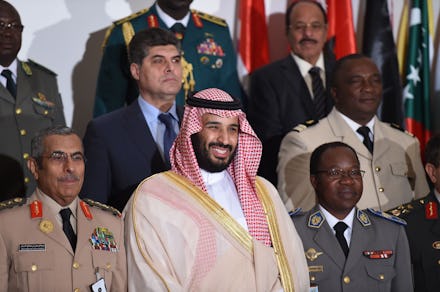Saudi Arabia Announces Creation of $2 Trillion Fund for Post-Oil Economy

The government of Saudi Arabia is planning a $2 trillion mega-fund to preserve the kingdom for the end of the oil age, Bloomberg reported.
Deputy Crown Prince Mohammed bin Salman told Bloomberg the Public Investment Fund will eventually control the staggering $2 trillion in assets, in part by selling off shares in state-oiled oil giant Aramco and diversifying the country's investments into other sectors. According to Bloomberg, if the fund reaches the total intended by the prince, it will be "big enough to buy Apple Inc., Google parent Alphabet Inc., Microsoft Corp. and Berkshire Hathaway Inc. — the world's four largest publicly traded companies."
"Undoubtedly, it will be the largest fund on Earth," Salman said. "This will happen as soon as Aramco goes public."
As the New York Times noted, Saudi Arabia remains the world's largest oil exporter, producing 10 million barrels per day — accounting for about 10% of global production. The paper reports its reserves are extensive, at 160 billion barrels, though the value of those reserves plummeted over 60% from June 2014 amid a worldwide fall in the price of oil.
While the move might have had paid off more had it occurred before oil prices fell, the creation of the fund at least provides some assurance of financial stability as the fossil fuel business enters an age of uncertainty.
"Why would you IPO your only valuable asset when oil is at its lowest point since 2003?" sustainable investing adviser Andrew Logan asked Bloomberg earlier this year. "The most obvious way to read it is they are starting to see the writing on the wall — that the age of oil is coming to an end and they are looking to cash out while they can."
Cashing out may perhaps also help prop up the continued rule of the House of Saud, one of the world's only remaining absolute monarchies, and whose rule has been marked by an atrocious human rights record with widespread use of torture, executions and labor abuses. Recent foreign policy and economic missteps have generated anxiety in the government, according to the Nation. A recent rise in executions is likely linked to apprehension over political unrest and the region's deteriorating security situation.
Even the fund itself will reveal some unpleasant truths — Global Energy Institute at the Atlantic Council Senior Fellow Jean-Francois Seznec told the Times the deal may result in some transparency: "All of a sudden, everyone could see how much money is being taken off the top by the royal family, and everyone wants to avoid that."